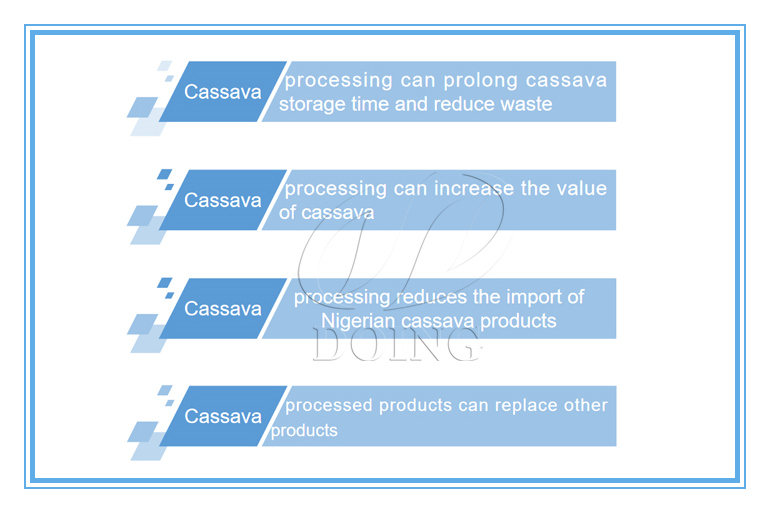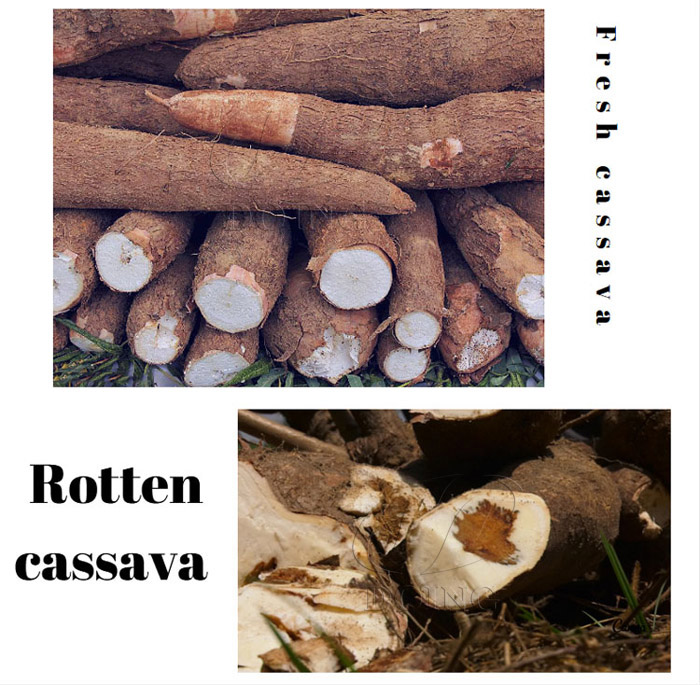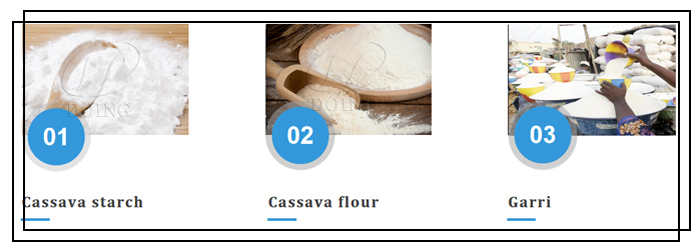Blog
 2019-09-11
2019-09-11In 1991, the total output of cassava in Nigeria has surpassed Brazil to become the world's largest producer of cassava. Since then, Nigeria has consistently ranked first in terms of cassava output in the world. So cassava plays an increasingly important role in Nigeria, especially after the rise of the cassava processing industry. The economic importance of cassava production in Nigeria reflects on different aspects, for example, it can increase cassava storage time, increase cassava value, reduce Nigerian cassava product imports, increase foreign exchange, increase cassava grower income, ect..
 Economic importance of cassava production in Nigeria
Economic importance of cassava production in Nigeria
And the following is the detail introduction of the economic importance of cassava production in Nigeria:
1. Cassava processing can prolong cassava storage time and reduce waste
Because cassava will be lignified, it can only be stored for 2-3 days, and then the cassava will rot and become woody. Therefore, cassava processing can reduce the waste of cassava after harvesting and prolong the storage time of cassava.
In addition, cassava contains toxic cyanide, which needs to be properly treated before it can be eaten. Cassava production and processing can reduce or even completely remove toxic substances from cassava, making cassava into garri, fufu, etc. that can be eaten directly.

2. Cassava processing can increase the value of cassava
Due to Nigeria has rich cassava raw materials, the price of direct sales of cassava is very low. And processing cassava into garri, cassava starch, cassava flour and other high value products can increase the value of cassava. Almost every family in Nigeria eats garri, so the produced garri can be eaten by itself or packaged and sold to stores. Cassava flour can be used for eating or making bread and can be sold to bakeries. As for tapioca starch, due to its wide range of uses and excellent performance, it has a wide demand in Africa and even in the world, and can be sold to textile mills, paper mills, etc.
 Cassava processing products
Cassava processing products
3. Cassava processing reduces the import of Nigerian cassava products
Despite Nigeria's leading position in cassava output, the country still imports large quantities of cassava products such as cassava starch and flour. For example, in 2017, the import value of cassava by-products such as starch, flour products and ethanol imported from Nigeria was close to 654 million US dollars. Therefore, if Nigerian domestic manufacturers can use local rich cassava raw materials to produce such products, it can not only alleviate Nigeria's import demand but also promote the development of the cassava processing industry.
4. Cassava processed products can replace other products and reduce the import of Nigerian wheat flour and other products.
The processing of cassava into cassava flour can replace some wheat flour for bread production and reduce wheat flour imports. Nigeria is the country that imports the most wheat from the United States. The annual import cost of wheat flour is about 635 billion naira. In order to reduce the import of wheat flour, the Nigerian government has adopted a strategy of replacing wheat flour with 10% cassava flour for the production of bread since January 2005. This will not only reduce the import of wheat flour, but also contribute to the development of the cassava flour industry.
In addition, in order to reduce the import dependence of corn starch, Nigeria has a program to increase the production of cassava starch to replace corn starch. Therefore, if Nigeria can make full use of its dominant crop cassava to process more products, Nigeria's imports will be greatly reduced.
 Cassava processing product cassava flour can replace wheat flour
Cassava processing product cassava flour can replace wheat flour
In 2010-2017, the global cassava processing market has a compound annual growth rate of approximately 2.1%, and the production in 2017 has reached approximately 284.9 million tons. Though Nigeria is the world's largest producer of cassava, 95% of cassava production in Nigeria is for human consumption and less than 5% for industrial production. Therefore, if you are a keen businessman, then you should already realize the importance of cassava production in Nigeria. At this time, it is a good time to carry out cassava processing and seize the market. If you want to carry out cassava processing projects, you can contact Doing Company. We have extensive project experience in countries such as Nigeria, Tanzania, Ghana, Indonesia, etc.
Want to know more about our products or services? Fill out the contact form below, and we’ll to get back to you and you will get the price list. Please also feel free to contact us by email or phone.( * Denotes a required field).